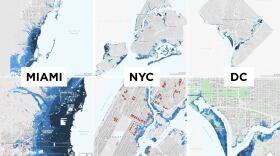Jacob Fenston
Jacob Fenston is WAMU’s environment reporter. In prior roles at WAMU, he was the founding producer of The Big Listen, interim managing producer of Metro Connection, and a news editor. His work has appeared on many national programs and has been recognized by regional and national awards. More importantly, his reporting has taken him and his microphone deep into muddy banks of the Anacostia River, into an enormous sewage tunnel, and hunting rats in infested alleys. His best story ever (as determined by himself) did not win any awards, even though it required recording audio while riding a bicycle the wrong way down the busy streets of Oakland, Calif.
Before coming to WAMU, Fenston was a reporter at KBIA in Columbia, Missouri, covering issues of health, wealth and poverty in the rural Midwest. In a previous life, he was a stage manager for a theater company in Portland, Oregon. While in Oregon, he got his start in radio, as a volunteer at community radio station KBOO. Fenston is a native of the great state of California, and holds a bachelor’s degree from Reed College and master’s degree in journalism from U.C. Berkeley.
-
A blanket of smoke from Canadian wildfires continues to move south and hover over many Northeastern cities. Officials have issued many health alerts — warning people to avoid outdoor activities.
-
When their rare Siberian tigers proved to be "just friends," the National Zoo turned to artificial insemination in hopes of creating a next generation.
-
Most streets that were closed across the nation so people could get outside more have since reopened. But some permanent closures, such as in Washington, D.C., and San Francisco, are wildly popular.
-
Many cities opened streets for pedestrians during the pandemic, temporarily making way for outdoor dining and strolling in new places. Cars won't return to some of them.
-
Community Forklift in Maryland is a beloved shopping spot for deals on architectural salvage, but like many such businesses, it's struggling with rising prices for warehouse space.
-
Even with sea level rising, Washington, D.C., will be largely safe from hurricane-related flooding because of its waterfront parks. But an NPR analysis finds that 1,000 people will still be at risk.
-
Even with sea level rise, Washington, D.C., will be largely safe from hurricane-related flooding because of its waterfront parks. But an NPR analysis finds that 1,000 people will still be at risk.
-
National Hurricane Center data for Miami, Washington, D.C., and New York City show development happening in at-risk areas, even as climate change brings more frequent and intense storms.
-
The noisy choruses of Brood X cicadas are over, but cicadas have left behind evidence: dead branches where they laid their eggs.
-
People in D.C. and other cities are starting to see periodical cicadas. The red-eyed flying insects known as Brood X emerge every 17 years.





